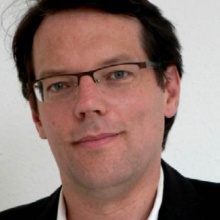Prof. Jörn Birkmann, head of the Institute for Spatial and Regional Planning (IREUS) at the Faculty 2: Civil and Environmental Engineering and coordinating lead author for the 6th Assessment Report of the Intergovernmental Panel on Climate Change (IPCC), together with Prof. Sue Grimmond (University of Reading/UK), Prof. Nektarios Chrysoulakis (Hellas Technical Research Institute, Athens/GREECE) and Prof. Andreas Christen (University of Freiburg) received an ERC-Synergy Grant with a total funding amount of 12.7 million euros (University of Stuttgart: 2,5 Million Euros) and a term of six years. For the first time, the EU's prestigious funding award went to a researcher at the University of Stuttgart.
Over the next six years, the project will investigate new dynamics and interactions between cities and urban development as well as climate and climate change. The development of a dynamic model will help to link previously unconnected research fields. Among other things, this involves the implications of climate change and extreme events on behaviour and mobility patterns as well as on the adaptation strategies of different population groups with regard to the central functions of cities such as living, working and recreation. Knowledge and methods from spatial planning and urban development, the natural sciences, climate modelling and remote sensing will be coupled. One goal of the project is the identification of different dynamics and so-called "urban archetypes", which capture different settlement structure types (built environment) as well as socio-demographic profiles and mobility patterns of different population groups (social environment) and thus provide information on emissions and adaptation capacities.
The research contribution from Stuttgart
Prof. Birkmann's contribution relates in particular to the development of a new assessment and modelling approach for questions of spatial exposure and vulnerability of people and infrastructures in cities to climate change and extreme events. Birkmann will develop an assessment model that identifies and defines socio-demographic dynamics, reactions to climate extremes and drivers of urban transformation for different types of urban structures. Specifically, he will investigate, among other things, how strongly the number of people in cities exposed to extreme heat will increase in the future, and how vulnerable different population groups and urban structure types are to heat stress. In addition, the analysis and modelling of current and future adaptation strategies of people and institutions (urban planning) and the impact of these adaptation strategies on the local climate will be addressed. It is likely, for example, that households will increasingly purchase air conditioning to adapt to longer and more intense heat periods in cities (in the context of climate change). However, this adaptation strategy can in turn lead to heating of urban spaces and more emissions. The consideration of these complex interactions between climate, climate change, built and social environment and the transformation of cities therefore requires new interdisciplinary research, which is addressed in the project.
Surveys on data acquisition
In addition to statistical data, Prof. Birkmann will use household surveys to collect specific information on how different households in different urban structure types deal with climate extremes and what adaptation options and limits exist. Birkmann will also lead the development of small-scale scenarios on the future exposure and vulnerability of population groups and infrastructures to climate extremes, such as heat stress. "Urban planning and risk management in cities in particular must not only ask themselves what risks already exist today, but also how the corresponding risks will present themselves 'tomorrow' - to which we must react today in the planning of our cities and infrastructures," says Birkmann.
In a first pilot phase, these aspects and questions will be analysed for the city of London and then transferred to other European cities. In a third phase, they will be examined worldwide. The interdisciplinary cooperation between spatial and environmental planners (IREUS), climate modellers (University of Freiburg, University of Reading) and remote sensing (Hellas) as well as the joint research on selected case studies is a particular advantage.
About the ERC Synergy Grant
The ERC Synergy Grants support teams of two to four promising scientists. They are aimed at excellent young scientists as well as established active researchers with outstanding scientific achievements. The projects should lead to discoveries at the interfaces between established disciplines and to substantial progress at the frontiers of knowledge. The development of new methods and techniques as well as unusual approaches are conceivable. The projects should only be possible through the cooperation of the named researchers. It must become clear why the project only makes sense and promises success through this cooperation.
| Contact | Prof. Dr.-Ing. Jörn Birkmann, University of Stuttgart, IREUS, Pfaffenwaldring 7, D-70569 Stuttgart, +49 711 685-66332, joern.birkmann@ireus.uni-stuttgart.de |
|---|


